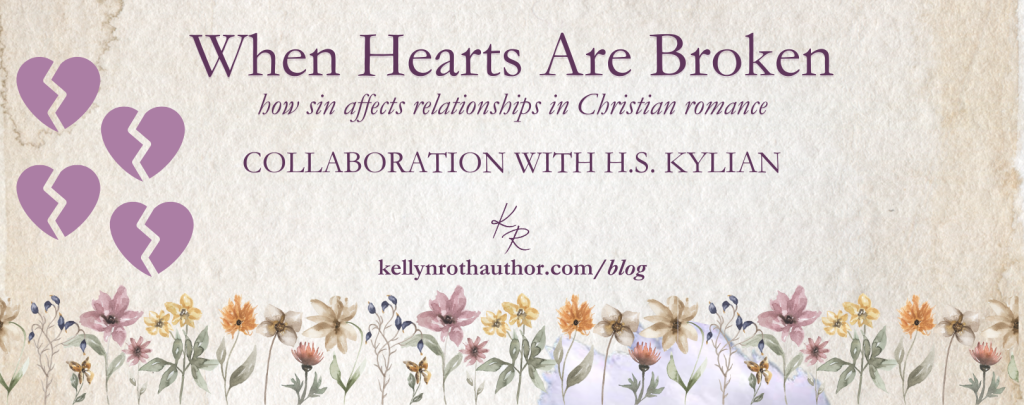Kellyn Roth here, and today I’m joined by H.S. Kylian to talk about Romance in Christian Fiction. Our first two posts were published here (about chemistry in Christian romance) and here (about kissing in Christian romance), but so definitely take some time to read those next time you get a chance!
However, in this blog post, Hannah and I will be discussing how to handle romance when hearts are broken in the event of sexual sin or other transgressions—specifically, we’ll explore some pitfalls Christian romances tend to fall into when taking on these subjects.
Hannah: Christian readers and authors alike seem to have this tendency to not like reading about romances gone wrong—and that’s totally understandable. We don’t want our favorite couples being torn apart or having conflict with each other; we just want them to be happy and healthy as a couple!
Alas, we live in a fallen world … and yet that factor doesn’t really seem to appear in a lot of Christian fiction out there. Like sure, it’s talked about, but there’s never really a gravity to it. It’s kind of given a Sunday School treatment.
Kellyn: It seems to me that we Christians are more equipped than any other person could possibly be to both portray those situations in a realistic light—and yet provide abundant hope through even the darker situations in life.
Since a romance is a relationship that requires a great deal of vulnerability between the couple, it’s the perfect relationship for highlighting both the importance of truth and honesty (including the fact that sin exists and is damaging) while showing how great God’s love and grace for us is.
Hannah: It doesn’t make sense to me when I see authors say they want their readers to be left hopeful yet the story itself comes across as more fluffy than hopeful, and it all boils down to this: the issue of sin is danced around. Which just isn’t a biblical way of dealing with it. At all.
Kellyn: The thing about hope is that it can’t really exist unless we live in the real world. Fortunately, we all live in the real world! So we all have hope. But I understand the temptation to write light, happy things believing that that will give our audience the most hope. However, that’s simply not true.
The conflicts don’t have to be big in every story, but if conflict doesn’t exist at all, we don’t have anything to hope for. The goal is to show how God’s light and love redeems darkness—not to pretend that darkness doesn’t exist at all!
Hannah: Look at the Book of Judges, for example! There’s a reason the pastor at my former church said that if it were a movie, it’d be rated NC-17, and it’s not hard to see why. There’s war, dismemberment, human sacrifice, someone’s guts are spilled … yet despite Israel sinning again and again, there is still the hope of salvation.
Kellyn: In a romance context, we have an opportunity to show sins but then also portray healthy relationships in the face of such situations, but how do we do that? Well, there are three things to keep in mind:
- Reality. We want to make sure we’re portraying how both Christians and non-Christians, depending on the situation, approach whatever sin they’re involved in, whether it’s a sin they committed or a sin that was committed against them. This requires careful, unbiased research.
- Repentance. Especially if your character is already a Christian, showing them actively repenting—both by admitting their sin and asking God and any involved parties for forgiveness and by moving forward and “sinning no more”—is an important step. I highly recommend bringing Scripture into this as you address the issue! It’s a must in Christian fiction, truly.
- Redemption. Show the character moving on from their sin and living in the joy and freedom of God’s grace as well as showing other characters (especially the love interest!) offering them similar grace and love. Though of course there will always be people in our lives who refuse to forgive us, or who are stuck in legalism, but that person should not be the love interest!
Hannah: I’ve got a few examples from my stories: in one (which I’ll call Story A), a young couple sinned in having sex before marriage, leading to their first child’s conception; in another story (which I’ll call Story B), before he became a Christian, the man (who I’ll call J) sexually sinned in the past and it led to his child being aborted – which really messed him up. He later meets another woman (who I’ll call L), who comes from a legalistic background and was sexually sinned against, leading to her becoming pregnant. And if you’ve already read For Better or For Worse, then you caught the references to Will’s alcoholism after he returned home from Vietnam and to Susie remaining faithful to him even though people thought she would be better off leaving him.
Kellyn: Similarly, I seem to end up in an abundance of situations where sin has led to broken hearts and a need for redemption. Of course, the biggest example that comes to mind is that of Ivy and Jordy from my novel Beyond Her Calling. Jordy has a past containing sexual sin, and he feels immense guilt over it. Given that he has already repented and is being typically Jordy-McAllen-Drama-King, a lot of the story involves the redemption Jordy needs to experience. It’s not that he needs to forgive himself so much as he needs to trust God!Of course, I have written other books where situations like this come up … though he’s a minor character, Riley Farjon from the same series is another example of a person who has a past, though his story more concerns his relationship with our actual hero, his best friend/cousin Peter! And I won’t go rambling on forever, but given that I’m currently outlining a series I’m joking referring to as “the 7 deadly sins,” well, I have definitely been thinking about this concept of redemption in Christ a lot!
Hannah: I’m fairly certain I’ve read stories where a character undergoes a supposed redemption arc yet it doesn’t come across that way, because again, there seems to be this unspoken rule that ‘Thou Shalt Not Write About Tough Topics’ circulating around the Christian writers-sphere and that if you do talk about tough topics, then ‘Thou Shalt Dance Around The Subject’—as in, “Gloss over it, don’t actually show the long-lasting consequences of said sin, or portray it as the heavy weight it is,” etc, etc.
And then the writers who dare to actually treat such topics with actual gravity and seriousness are the ones who get lambasted. All because they don’t believe in sanitizing reality.
When it comes to redemption arcs in romance novels in which the circumstances involve sexual sin, it can definitely be a painful process. In Story A, the couple hesitates (for at least the first few years of their marriage) to try for another child because of their past sin. Though they repented and they see their son as an undeserved blessing—proof of God’s grace in fact—they still struggle with the guilt that crops up from time to time, especially when their son asks why he doesn’t have little brothers and sisters.
In Story B, as J is learning how to rightly love a woman through his relationship with L and cares for her child as though said child was his own, he still struggles with the guilt over having had sex out of wedlock, resulting in a child who was killed in the womb. On L’s side, she’s struggling with her worth as a person due to what happened to her, and has doubts she can bond with her daughter. And amidst this struggle, she’s learning to trust that J genuinely loves her and her daughter.
Kellyn: I think sometimes the lasting spiritual effects of past sins are glossed over more than anything. We like to wrap things up in a nice, tidy bow, but that’s just not the truth of life. I understand that for story purposes, some things do have to be resolved—but not if it means ignoring the healing process because, at the end of the day, our sins (and the sins against us) are damaging. God doesn’t just ask us not to sin because He randomly decided to do so—amongst other reasons, the law exists for our own good!
In a lot of my stories, I’m dealing with this concept in other situations—such as various ills of the entire The Chronicles of Alice & Ivy series, honestly, which is 90% “and then we had to deal with that small lie or one event for twenty years.” In truth, that’s why I love writing family sagas! It gives you space to expand these concepts. But even in standalones, you can make this work. It just takes a slightly different set of skills.
Hannah: Another thing to consider if you’re going to tackle sexual sin in a romance novel is to acknowledge where the root of that sin comes from—the heart.
“The heart is deceitful above all things, and desperately sick; who can understand it?” — Jeremiah 17:9 | ESV
Holding hands, hugging, and even kissing isn’t what led to the couple in Story A sinning, and abstaining from it didn’t prevent L from being raped; it was lust and the lack of self-control that led to both, which is sin.
(As a side note, whether people want to admit it or not, those three things—hand-holding/hugging/kissing—can indeed be done within the boundaries of self-control—though admittedly, every couple is different when it comes to physical affection before marriage and need to be seriously prayerful about that stuff)
Ultimately, the couple in Story A sinned because they’re sinners. Sinners saved by grace, but still sinners. And ultimately, L was raped because of sin.
I think that’s another thing that sometimes gets missed in Christian fiction—the fact that we are a) born with sinful hearts, and b) even after being saved, we still struggle with sin every single day.
Kellyn: I feel like there are a lot of ways Christians fail when it comes to the discussion of sins, especially sexual sins, in Christian fiction, but one of the main ones I see is just that … it’s the excuses. “If you had just done it this way, the right way, the Christian way, this wouldn’t have happened!” or “It was just a mistake!” are the two opposite ends of the extreme. Neither of them actually address the deeper heart issue or provide a lasting solution.
But it’s simple: turn to God in all matters and surrender to Him. Treating it as a matter we could easily resist and turn from without the help of God AND treating it like a simple mistake that isn’t really a big deal are both forms of sinful pride.
Hannah: Mh-hm. It’s quite frustrating when I’m reading a book and the Gospel presentation comes across as a sales pitch rather than the life-giving truth it is. And it’s even more frustrating when baby Christian characters start acting mature all of a sudden … like excuse me, where did the sanctification go???
Kellyn: In conclusion, there are a lot of things to be discussed when it comes to this complex topic—more than could possibly go into a single blog post—but the primary concern is always to seek God through prayer and Bible-reading!
What do you feel needs more discussed in Christian romance?
TTFN!
~Kell~
Are you interested in getting to know me & my books better? Join my email list!


